Je suis un oiseau.
Ni l'abeille, ni la baleine.
Il mange une abeille.
I'm not sure when I'll be using those phrases, but if Duolingo is trying to make learning French memorable, it has succeeded. When I picked up the app, I wasn't expecting much--there was no way an iPhone app could teach me a language I had no knowledge of. Two months of using Duolingo later, I'm willing to admit I was wrong. While it's not a substitute for classroom learning, Duolingo is a useful way to start learning a language on your own time and at your own pace.
Immersive learning is the main principle behind Duolingo's method. Instead of sitting you down and explaining you grammar theory, Duolingo drops you right in to translating various words and phrases, with a few hints along the way. The lessons start simple and cover the basics and short phrases before progressing to more complex skills and longer translations. In addition to translating words and phrases back and forth, users are given sentences they must pronounce properly, helping them learn the sounds of the language.
Duolingo can be used either as a free app (for iOS, Android, and Windows phones) or as a website. There are no in-app purchases, so in this world of freemium content, Duolingo truly is free; there is not a single cent you have to pay ever, for anything. Instead, users earn Lingots that they can exchange for bonus skills or help as they progress through lessons.
The app's design is attractive and simple, with no extraneous options or screens for the user to sort through. Progression through lessons is linear, so you won't lose your spot when you put the app down for a day. The website has more options, but it's still easy to navigate, and has the added bonus of discussion questions users can read over to learn more about the lessons they're taking. Both the website and the app have a social component, where you can add your friends and compete with your weekly progress--the more lessons you do, the more experience points you get, and the higher you are on the leaderboard.
Duolingo isn't perfect; it would be nearly impossible to become wholly fluent using Duolingo alone, and the app's lack of the discussion questions the website has is detrimental when you're stuck on a word or phrase. The app also suffers compared to the website when it comes to handing out experience points--on the website, up to ten experience points are rewarded vary on the length and success of the lesson, while on the app every lesson is always rewarded ten points, meaning it's harder to gauge what you should be focusing on based on your feedback.
I also found the bonus skills a lot harder than the other lessons. They would likely be best left until you've progressed through almost all of the lessons, which defeats their purpose as rewards in the beginning. The Flirting lessons are also almost useless for anything other than a laugh, as the lines the app gives you would never go over well.
However, Duolingo is still a very worthwhile language learning system to pick up. You can set your own daily goal, meaning you are the one dictating how much time you can put into the lessons, which is perfect for a busy schedule. On the app, Lingot rewards can be spent towards fun outfits for Duolingo's mascot, and on the website, Lingots can be used towards personal challenges. Friendly competition can keep you on top of your goals for the week, as well--I know I've had days where I've felt too exhausted to do my lessons, but the goal of staying on top of my score board inspired me.
Duolingo is easy to keep up with, and is very forgiving if you miss a day (or more) of lessons. As time goes on, skills you've learned lose their mastery, and you can redo them to refresh your memory. Missing a day of lessons only knocks down the mastery on a few skills, and you don't lose your experience points or Lingot rewards. Even if your mastery is high, you can still redo any lesson at any time, letting you decide if you need to strengthen certain skills. Experienced language learners can take advantage of the skill mastery system and test out of certain parts of the lessons, meaning someone with a few years of a language under their belt isn't stuck learning the basics.
Most important of all, Duolingo is fun. Not all of the phrases for users to translate are funny, but many are, and it keeps your attention. I know I learn best when I can laugh at something, and I'm not forgetting how to say "Il mange une abeille" any time soon. Duolingo's strange translations even have a dedicated blog, WTF Duolingo, where users can submit their own weird Duolingo finds.
Learning a language is a complicated process. It takes a combination of studying, practicing, and listening to really get a grasp on fluency. While Duolingo probably won't teach you an entire language all on its own, it's a great way to get started, brush up on some old skills, or supplement your own classroom learning on your own time, all while having fun.
Les chats boivent du thé!
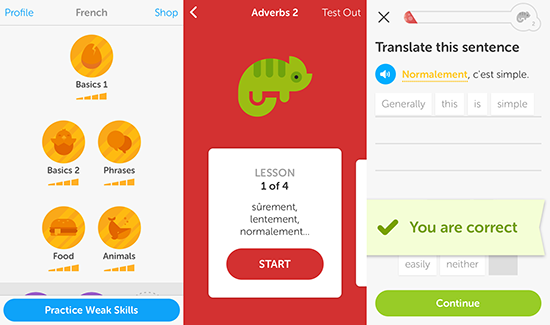
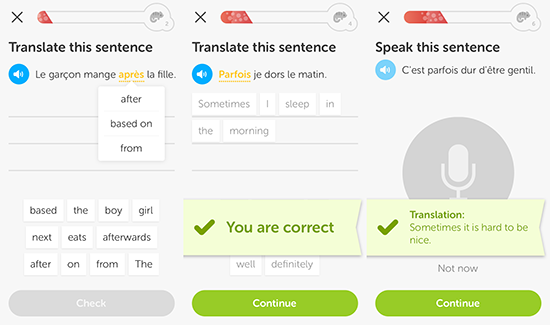
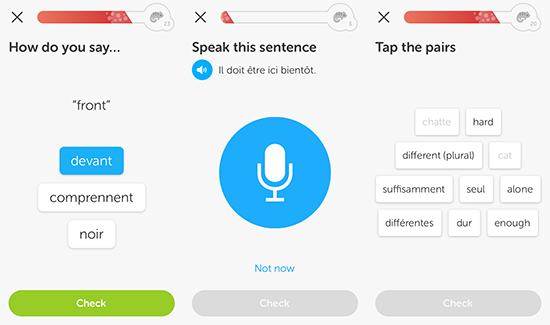
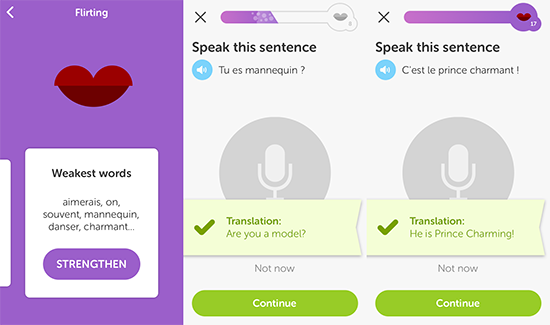
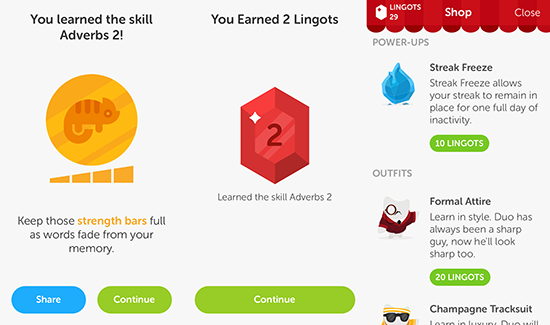
Leave a comment